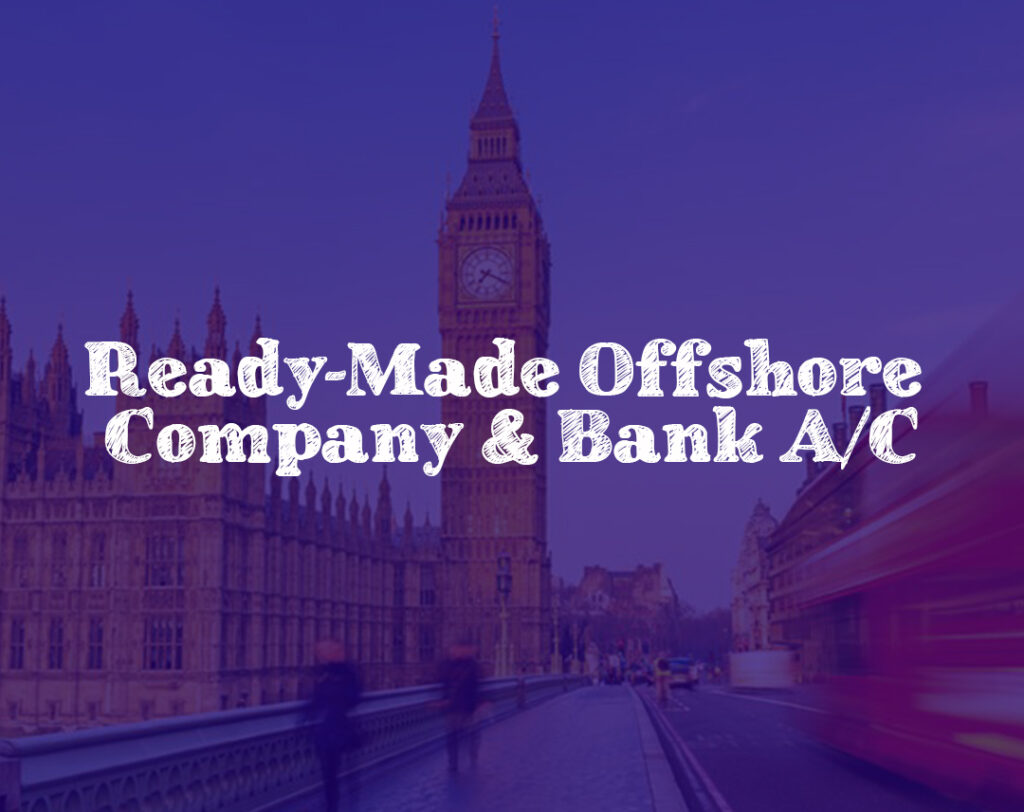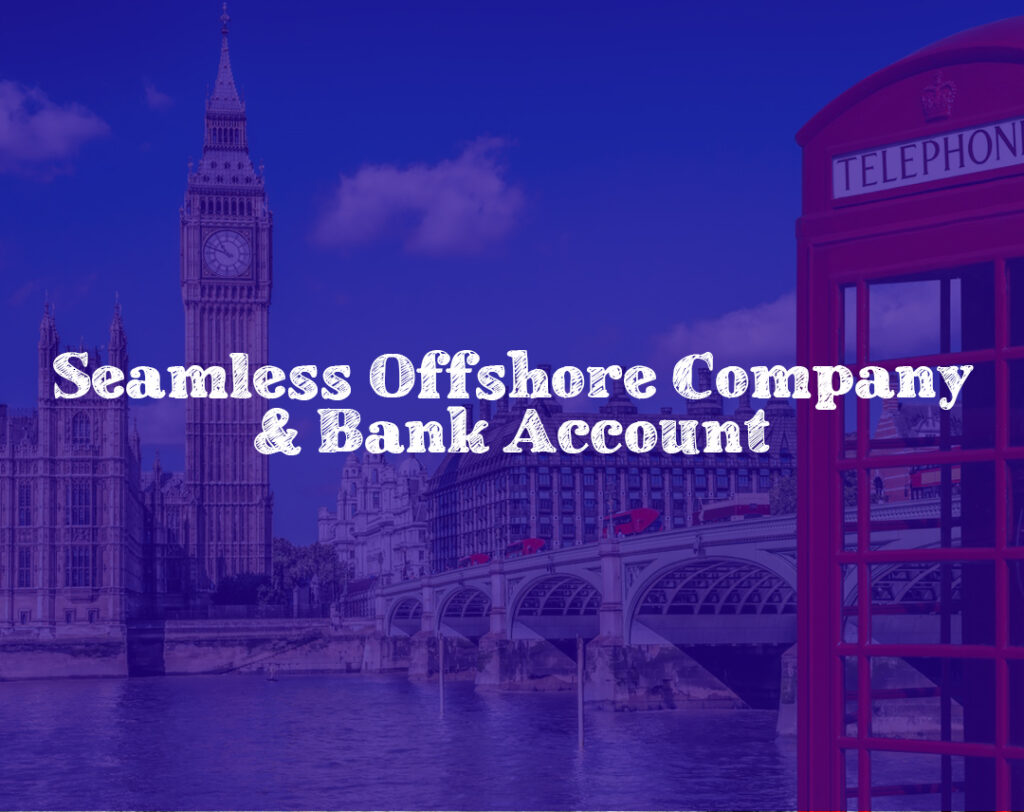Offshore Company and Bank Account
An offshore company and bank account can enhance financial flexibility and privacy. Here in this article, I am discussing why people choose offshore banking, how to transfer money, and explore different types of offshore accounts. Come and have a look.


Reviews 5.0

Top Reasons to Set Up an Offshore Company and Bank Account

Maximize Tax Efficiency
Offshore companies can help you legally. You can reduce your tax burden by taking advantage of the lower tax rates or tax exemptions offered by certain jurisdictions. This allows you to keep more of your profits and reinvest them into your business or personal matters.

Enhance Asset Protection
You can structure your assets through an offshore company. It willprotect them from potential creditors, lawsuits, and even political instability in your home country. This layer of protection ensures that your wealth remains secure and accessible only to you.

Achieve Greater Privacy
Many offshore authorities have strong privacy laws to keep the business activities and personal financial details confidential. This level of sensitivity is particularly valuable for high-net-worth individuals and businesses looking to protect their financial privacy from public inquiry.
What Is an Offshore Company
An offshore company is a business entity registered outside the country where its owners live or do most of their work. People often set these up in places that give them better deals, like lower taxes more privacy with money, and fewer rules to follow. Picture running a company where you can cut down on taxes, keep your assets safe from local political problems, and work with a level of secrecy you can’t get in your home country. This is the edge you get when you start an offshore company.
What makes offshore companies so attractive is how versatile they are. You can use them for many things, from handling international trade and owning intellectual property to protecting your personal wealth and planning for when you retire. Let’s say you’re a business owner with big dreams for the world. An offshore company can help you move through different markets, while also giving you a legal setup that shields your assets from people you owe money to or legal fights. Plus, the extra privacy that many offshore places offer means that details about who owns what and how money moves around stay secret giving you peace of mind and security.Top of Form
Benefits To Get If You Buy Off the Shelf Company in UK
Offshore company and bank account comes with a bundle of benefits that other companies enjoy and which are slowly making them popular to both businesses and individuals for maximizing their fullest potential. Such reasons are very convincing in letting one consider offshore services, whether in tax optimization, asset protection, or business expansion in the global market.
Grow Your Business with LinkedIn
Understanding Offshore Company and Bank Account
For quite a long time now, interest in offshore companies and bank accounts has centered on how more control and privacy can be exercised over one’s finances. An offshore company and bank account is normally a business entity set up in a foreign country, often selected for its favorable tax laws, regulatory benefits, and confidentiality. This enables businesses and individuals to manage their assets more effectively, protect their wealth, and sometimes also reduce their tax liabilities. Companies often come with the allurement of offshore banking. An **offshore bank account** is a bank account opened in a bank outside one’s home country that brings about a number of advantages, such as international investments, multiple currency options, and enhanced privacy. Most people are lured to offshore banking because of better levels of confidentiality and security in the financial activities involved.
This is one of the major reasons why people have offshore bank accounts. One can spread funds in an offshore account to diversify a current financial portfolio and protect its assets from any form of political or economic instability within the country. Moreover, offshore accounts most of the time offer more flexible management across borders—making these an excellent option for those involved in international business or simply considering ways to preserve wealth for future generations.

Tax Optimization
A business or individual will find that one of the major reasons to go offshore is that there is significant tax savings attached to the deal. More often than not, these offshore jurisdictions have attractive tax structures which can be in the form of lower corporate tax rates, reduced capital gains taxes, or even complete exemption from tax. This would mean that companies are able to retain a greater share of earnings that would otherwise be paid to the government and reinvest them in the business or enhance personal wealth. The tax benefits for individuals can help in better estate planning and wealth management, thus making sure more of their hard-earned money remains in their pockets.

Increased Privacy and Asset Protection
One of the most important reasons for offshore companies or bank accounts is privacy protection. Most countries that host offshore companies and banks have very tight banking and corporate confidentiality laws that assure anonymity to account holders and the transactions they make. This level of confidentiality may be very critical to high-net-worth individuals or businesses that would not like to disclose their financial activities. Secondly, offshore accounts provide very strong protection from creditors or legal opponents seeking access to your money—pretty impossible to allow. This can be rather instrumental in shielding your wealth from possible lawsuits, political instability, or economic downturns in your homeland country.

Global Access and Flexibility
It can offer access to more international markets with offshore companies and bank accounts, providing a greater variety of investment opportunities. Conducting business in many diverse currencies and jurisdictions helps you spread your assets, reducing the risk of dependency on the economy of just one country. It is in this global flexibility that businesses engaged in international trade or persons having enormous financial interests across borders benefit greatly. Secondly, understanding how to transfer money from an offshore account is essential for ensuring that you can move funds efficiently and securely across borders, maintaining seamless financial operations regardless of where you or your business are located.
5 Steps on Buy Off the Shelf Company in UK
The first and most crucial step in establishing an offshore company and bank account is selecting the right authority. This decision should be based on a thorough analysis of various factors such as tax benefits, political stability, ease of doing business, and the level of confidentiality offered. Jurisdictions like the Cayman Islands, Hong Kong, and the British Virgin Islands are well-known for their business-friendly environments and strong legal protections. For example, the Cayman Islands are famous for their tax-neutral stance, while Hong Kong offers excellent connectivity to Asian markets. Your choice of authority will greatly influence your company’s operations, compliance obligations, and overall success.So, take your time to research and select the best option for your needs.
Once you’ve settled on an authority, the next step is to legally incorporate your offshore company. This process involves preparing and submitting the necessary documentation, such as the Articles of Incorporation, a list of directors, and the company’s intended business activities. You’ll also need to pay registration fees, which can vary significantly depending on the authority. Engaging a local agent or law firm can be highly beneficial, as they can guide you through the complexities of local laws and ensure that all paperwork is correctly completed. They may also help you choose a suitable company structure, whether it’s a limited liability company (LLC), an international business company (IBC), or another form of entity that best fits your objectives.
With your offshore company officially registered, the next move is to open an offshore bank account. This step is vital for managing your company’s finances, facilitating international transactions, and safeguarding your assets. Offshore banks typically offer a wide range of services, including multi-currency accounts, investment opportunities, and access to global markets. To open an account, you’ll generally need to provide extensive documentation, including proof of identity, company formation documents, and a clear explanation of your business activities. Some banks may require a personal visit to finalize the account setup, although others offer remote account opening services. Choosing the right bank is critical. Factors like banking fees, minimum deposit requirements, and the bank’s reputation for security and customer service should be carefully considered.
Operating an offshore company and maintaining an offshore bank account comes with a responsibility to comply with various legal and regulatory requirements. This includes following to international laws like anti-money laundering (AML) regulations, tax reporting obligations under the Foreign Account Tax Compliance Act (FATCA) or the Common Reporting Standard (CRS), and any specific rules imposed by the offshore jurisdiction. Failing to comply with these regulations can result in severe penalties, including fines, account closure, or legal action. Therefore, it’s essential to stay informed about the ongoing legal landscape in both your home country and the jurisdiction where your offshore entity is based. Engaging a legal or financial advisor who specializes in offshore services can be invaluable in helping you navigate these complexities and ensuring that your operations remain above board.
After setting up your offshore company and bank account, it’s crucial to manage them properly to maximize their benefits. This involves paying any required annual fees, filing necessary reports, and ensuring your company remains in good standing with the authorities in your chosen authority. Additionally, staying proactive about changes in international tax laws or regulations is essential to avoid any unexpected legal or financial challenges. Regularly review your business strategy and financial structure to ensure they continue to align with your goals. For example, you might need to reassess your authority if new tax laws are introduced, or explore additional offshore banking services as your business grows. Maintaining a strong relationship with your offshore bank and staying informed about their services and any changes in their terms can also provide ongoing benefits and peace of mind.
Frequently Asked Questions
Generally, such types of offshore banking include personal accounts, corporate accounts, and investment accounts. Each type is oriented to serve different purpose, like personal savings for home use, business, or investments account, or investments.
Offshore work generally refers to business activities conducted outside a company's home country, often because of the favourable regulations, tax benefits, or cost efficiencies. This includes financial services, customer support, and manufacturing.
Offshore banking is legal so long as it is done in observance of all applicable laws and regulations, including tax reporting requirements.
This involves taking into account such factors as tax rates, privacy laws, ease of doing business, and political stability. All of this, in a way, will call for expert advice from a financial advisor or legal expert.
Most offshore banks allow their account holders online access to an account from anywhere in the world.
The cost depends on both the jurisdiction and services needed but usually includes formation fees, legal, and ongoing administration costs.








